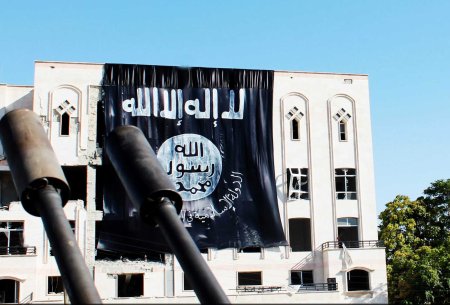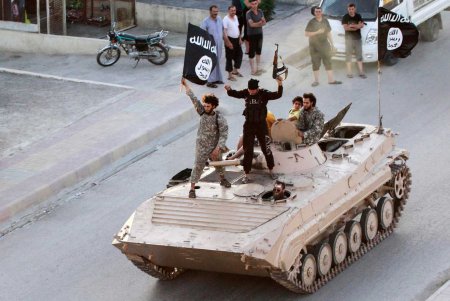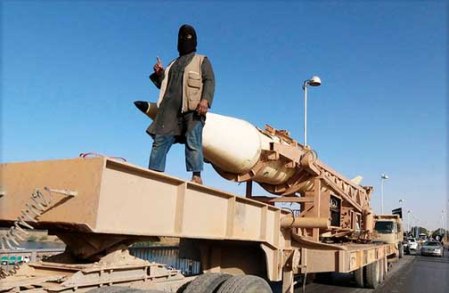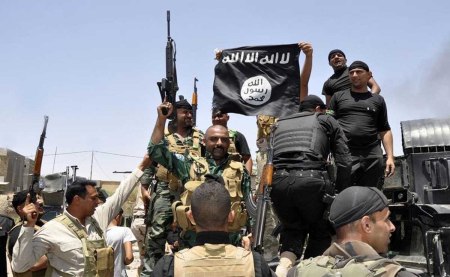Tareq al-Abd As-Safir
Imagine yourself in a quiet town, by a river along whose banks are fertile agricultural fields. Imagine you are walking by archaeological sites that imbue the place with a special charm. Imagine a city where the population works quietly, where the streets are clean, where you only find a few things rolling here and there, and where the squares are accustomed to hold rallies for special recurring events.
These special events are the execution and decapitation operations, and those few things rolling here and there are nothing but severed heads.
Welcome to Raqqa
Despite everything that is happening, there is still movement to and from the “State of Raqqa,” be it from Deir Ez-Zor, or Turkey through the Tal Abyad crossing, or the countryside of east Aleppo. The buses bound for Damascus, Hama, and Homs also cross Raqqa. Naturally, everyone crosses the checkpoints erected by IS (Islamic State), which is rigorously searching for military members or activists wanted on charges that include secularism and cursing “the State,” among others. Of course, women have to wear a veil and they have to be accompanied by a man from the family, a muhrem (a man in a legal relationship with the women).

The city of Raqqa has not changed much in its social composition, but it has put on an IS cloak. It morphed from being the capital city of the province of Raqqa into the capital city of the “Wilaya of the Islamic State.”
Al-Nahim roundabout and Al-Saha roundabout are the theaters of death sentences, some of which are carried out by knife beheadings while others by shooting or stoning to death. In some cases, the victims are crucified for three days. In others, the severed heads remain in the squares or city streets.
Markets and cafes operate normally, especially during the evening. There is no deficiency or chaos in terms of prices, and there are no armed men on the streets, with the exception of the IS elements, that is. Everyone is expected to stop whatever they are doing and join the prayers on time. Women wear loose black clothes with the niqab. As for the men, they are not allowed to have a haircut that is “Western-style.” There are battalions specialized in monitoring people and detecting any kind of violation. In such cases, the punishment ranges from beatings to long detentions, which are occasionally reduced depending on the whim of the militants.

Services in the town have not experienced a significant change. While the power and water supply is experiencing great rationing, the local telephone services are working well. The international and cellular calls only work after several attempts.
Universities and schools, whether public or private, are closed upon an IS decision, pending the preparation of a new curriculum that would replace the old one that is “contrary to Islam.” Teachers who find themselves competent were called to apply and attend a “Sharia cycle” to prepare the new curriculum. A teacher predicted that the Syrian universities’ acceptance list will be devoid of any branch of college, institute or hospital in Raqqa.
Despite everything, there are some governmental institutions still working in Raqqa, such as the electricity and water utilities, and most important, the Euphrates Dam, whose work is limited to a minimum as the water levels decline due to the drought and the Turkish decision to rigorously reduce the water flow to Syria.
The biggest disaster lies in the health sector amid a complete absence of medical services and the flight of a large number of doctors. For its part, the opposition, with the “National Coalition” at its forefront, refuses to provide any support.
An activist said that simple diseases are leading to death, and explained that the hospitals are only providing first aid, with the exception of the National Hospital, where the situation is slightly better.
From the FSA to Jabhat Al-Nusra to IS
Despite all the risks Raqqa opposition activists face to their life, talking with them appears easy. There is resentment towards the opposition’s neglect of the city and this resentment is deep-seated because the activists believe, that if political errors would have been avoided, it could have spared the sons of the Euphrates a nightmare named IS.

Mayzer, 29, a press photographer, said, “The coalition bears the greatest responsibility for the chaos. It could have played a major role from the early days of the liberation of Raqqa, and the activists have repeatedly called on it to do so, but their calls were ignored, thus leading the city to face its current fate.”
Abu Ibrahim, an activist who is still working in the city, said that all the parties are responsible for what is happening: “Any party could have taken advantage of the entire city and impose a different reality. IS was just a small faction like any other faction. It began kidnapping and killing activists, so the residents of Raqqa and the Descendants of the Prophet brigades confronted them at a time when Jabhat al-Nusra, Ahrar al-Sham, and the rest of the FSA (Free Syrian Army) groups refused to participate in the fighting, arguing that they are brothers and that they cannot enter into such strife. Subsequently, the Descendants of the Prophet brigades, along with other groups, lost their headquarters due to bombings carried out by IS. In early January, fighters from Raqqa tried to regain the city, but Ahrar al-Sham subsequently retreated because Jabhat Al-Nusra refused to provide them with weapons. Thus, IS returned to imposing its full grip.”
Another activist, who requested anonymity out of fear for his life, said that the slogan of unity was the reason behind everything that is happening today: “We turned a blind eye to many details, including the chaos of easily available arms, the repeated arrests and kidnappings, the battalions that were smuggling oil and selling it, the absence of any authority or local council. We kept quiet under the pretext of unity which should not be disturbed by isolated individual errors. This pretext also applied to IS, as many considered talking about their conduct as a crime and kept reminding us of the role of IS elements in the battles, of their courage versus the errors and flaws of the FSA.”
Non of the opposition activists though was ready to acknowledge, that without the help of radical Islamic fighters they would not have been able to wrestle the city from government control.

Imagine yourself in a quiet town, by a river along whose banks are fertile agricultural fields. Imagine you are walking by archaeological sites that imbue the place with a special charm. Imagine a city where the population works quietly, where the streets are clean, where you only find a few things rolling here and there, and where the squares are accustomed to hold rallies for special recurring events.
These special events are the execution and decapitation operations, and those few things rolling here and there are nothing but severed heads.
Welcome to Raqqa
Despite everything that is happening, there is still movement to and from the “State of Raqqa,” be it from Deir Ez-Zor, or Turkey through the Tal Abyad crossing, or the countryside of east Aleppo. The buses bound for Damascus, Hama, and Homs also cross Raqqa. Naturally, everyone crosses the checkpoints erected by IS (Islamic State), which is rigorously searching for military members or activists wanted on charges that include secularism and cursing “the State,” among others. Of course, women have to wear a veil and they have to be accompanied by a man from the family, a muhrem (a man in a legal relationship with the women).

The city of Raqqa has not changed much in its social composition, but it has put on an IS cloak. It morphed from being the capital city of the province of Raqqa into the capital city of the “Wilaya of the Islamic State.”
Al-Nahim roundabout and Al-Saha roundabout are the theaters of death sentences, some of which are carried out by knife beheadings while others by shooting or stoning to death. In some cases, the victims are crucified for three days. In others, the severed heads remain in the squares or city streets.
Markets and cafes operate normally, especially during the evening. There is no deficiency or chaos in terms of prices, and there are no armed men on the streets, with the exception of the IS elements, that is. Everyone is expected to stop whatever they are doing and join the prayers on time. Women wear loose black clothes with the niqab. As for the men, they are not allowed to have a haircut that is “Western-style.” There are battalions specialized in monitoring people and detecting any kind of violation. In such cases, the punishment ranges from beatings to long detentions, which are occasionally reduced depending on the whim of the militants.

Services in the town have not experienced a significant change. While the power and water supply is experiencing great rationing, the local telephone services are working well. The international and cellular calls only work after several attempts.
Universities and schools, whether public or private, are closed upon an IS decision, pending the preparation of a new curriculum that would replace the old one that is “contrary to Islam.” Teachers who find themselves competent were called to apply and attend a “Sharia cycle” to prepare the new curriculum. A teacher predicted that the Syrian universities’ acceptance list will be devoid of any branch of college, institute or hospital in Raqqa.
Despite everything, there are some governmental institutions still working in Raqqa, such as the electricity and water utilities, and most important, the Euphrates Dam, whose work is limited to a minimum as the water levels decline due to the drought and the Turkish decision to rigorously reduce the water flow to Syria.
The biggest disaster lies in the health sector amid a complete absence of medical services and the flight of a large number of doctors. For its part, the opposition, with the “National Coalition” at its forefront, refuses to provide any support.
An activist said that simple diseases are leading to death, and explained that the hospitals are only providing first aid, with the exception of the National Hospital, where the situation is slightly better.
From the FSA to Jabhat Al-Nusra to IS
Despite all the risks Raqqa opposition activists face to their life, talking with them appears easy. There is resentment towards the opposition’s neglect of the city and this resentment is deep-seated because the activists believe, that if political errors would have been avoided, it could have spared the sons of the Euphrates a nightmare named IS.

Mayzer, 29, a press photographer, said, “The coalition bears the greatest responsibility for the chaos. It could have played a major role from the early days of the liberation of Raqqa, and the activists have repeatedly called on it to do so, but their calls were ignored, thus leading the city to face its current fate.”
Abu Ibrahim, an activist who is still working in the city, said that all the parties are responsible for what is happening: “Any party could have taken advantage of the entire city and impose a different reality. IS was just a small faction like any other faction. It began kidnapping and killing activists, so the residents of Raqqa and the Descendants of the Prophet brigades confronted them at a time when Jabhat al-Nusra, Ahrar al-Sham, and the rest of the FSA (Free Syrian Army) groups refused to participate in the fighting, arguing that they are brothers and that they cannot enter into such strife. Subsequently, the Descendants of the Prophet brigades, along with other groups, lost their headquarters due to bombings carried out by IS. In early January, fighters from Raqqa tried to regain the city, but Ahrar al-Sham subsequently retreated because Jabhat Al-Nusra refused to provide them with weapons. Thus, IS returned to imposing its full grip.”
Another activist, who requested anonymity out of fear for his life, said that the slogan of unity was the reason behind everything that is happening today: “We turned a blind eye to many details, including the chaos of easily available arms, the repeated arrests and kidnappings, the battalions that were smuggling oil and selling it, the absence of any authority or local council. We kept quiet under the pretext of unity which should not be disturbed by isolated individual errors. This pretext also applied to IS, as many considered talking about their conduct as a crime and kept reminding us of the role of IS elements in the battles, of their courage versus the errors and flaws of the FSA.”
Non of the opposition activists though was ready to acknowledge, that without the help of radical Islamic fighters they would not have been able to wrestle the city from government control.

Keine Kommentare:
Kommentar veröffentlichen